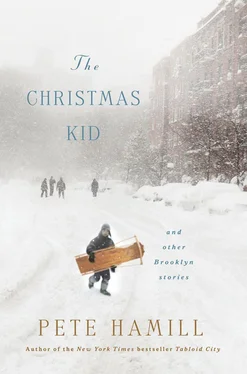That summer, the war broke out in Korea, but they didn’t talk about the war; it was in a remote place; it had nothing to do with them. But they were aware that the world was changing around them. People were locking doors that had never before been locked. A boy from 17th Street was found dead in the park, and for the first time Eddie Leonard heard the word “overdose.” The word “they” began to appear in the common narrative of the neighborhood. “I hear they stuck up Barney Quigley’s last night.” Or: “They stabbed a kid outside the Y this afternoon.” Or: “They robbed the Greek’s.” Another new word was “heroin.”
Late in August, after a Saturday night movie, Eddie Leonard and Dotty Haddam climbed the hill above the Swan Lake in Prospect Park, and when they came down, they were no longer virgins. The rest of the summer was a blur; joy, fear, and amazement were combined with a sense of intimate conspiracy and, of course, the heart-stopping knowledge of sin. Moving among the others, on the beach at Coney or at the dances in the park, they felt special, certain of their shared love and damnation, guarding their dark secret.
But as the nights became chilly, Eddie Leonard started to dread the coming of winter. In that neighborhood in those years, no young people had cars or apartments or the price of a hotel room. They had the park and the beach. Nothing else. Eddie began to talk to Dotty Haddam about running away to Florida, about how amazing it must be to sleep between sheets in a bed, and wake up together in the morning. She resisted, retreated into silence, or told him that such ideas were foolish. They were too young. They would end up in jail.
And then one night, such talk became academic. Eddie Leonard and Dotty Haddam went to their hill. They murmured, kissed, collapsed on the grass. And then from the shadows, screaming in his language and flailing at them both with a broom handle, came Mr. Haddam. His eyes were wide with anger, and when he tried to strike his daughter with the broom handle, Eddie Leonard stepped in and knocked him down. That was the end of it. Two days later, Dotty Haddam was taken from the neighborhood to live with an aunt in New Jersey. Eddie Leonard never went into the store again.
He heard from her while he was in the army in Germany. The letter was brief, almost businesslike, and it told him that she was marrying a Syrian guy whose family came from Beirut. But she thought of Eddie often and would always remember him. When he looked at the date, he realized she was already married, and he crumpled the letter, threw it in a corner, and went into Wiesbaden to get drunk.
Then, one hot afternoon in the summer of 1969, he ran into her on 57th Street. She called his name, and for a moment he stood looking blankly at this short, heavyset woman, until she said: “Eddie, it’s me. Dorothy…” He embraced her and they went into a coffee shop next to Carnegie Hall, and told each other how their lives had turned out. Eddie was a lawyer now, divorced, with two sons, living alone on the East Side; Dotty had three daughters, one of them a junior in high school. Her mother was dead, her father had gone home to Beirut with her sister. Dotty’s husband ran a large grocery store in Washington Heights and they lived in New Jersey. She said all of this in a cool way, as if reciting a résumé. Then Eddie asked her if she loved her husband.
She smiled, and glanced into the crowded street.
“Love is for children,” she said. And then looked at him frankly and added: “Maybe you get one good summer. If you’re lucky.”
They went to his apartment and made love, in a sad, grieving way, for the first time together in bed. And when they were finished, she began to cry uncontrollably, saying that they must never ever do this again. It was wrong. She was married. She had children. It was a sin. She’d never done this before, and would never do it again. She was back the following Thursday afternoon, dressed more elegantly, more carefully made up; and the Thursday after that; and every Thursday that summer. She lost weight. She wrote poems for him again. He gave her, with a laugh, a copy of Caesar’s Gallic Wars . And they lived again the tangled emotions of that old summer. It ended again in the fall.
“He knows,” she said that final Thursday. “He doesn’t know who it is, but he knows. And he’ll find us. I don’t want that. For me, or you, or my daughters. Or for him. I hope you understand that.”
And that was that. Until five years later. Sitting over coffee one morning with the Daily News, he saw her picture, her face contorted in anger and protest. She was standing outside a grocery store, a cop beside her. The story explained that her husband had been shot dead in a holdup. Two nights later, Eddie Leonard went to the wake. The room was packed with wailing mourners, and Eddie Leonard found Dotty in the front row of folding chairs. She was all in black, her face covered with a veil. He uttered the conventional words of sorrow and asked her about her plans.
“I’m taking him home,” she said, staring through the veil at the coffin. “To Beirut. And all of us are going with him. It’s finished here. Killers everywhere. Junkies. Murderers. We’ll sell the store and the house. And just go away. Away from killers. Away. Away.” She paused. “Goddamn New York.”
A week later, she sailed for Beirut. The following year, the civil war began, and in the evenings, watching the terrible films on the news, Eddie Leonard would remember summer evenings in the placid hills of Brooklyn, when he and Dotty Haddam were young. He never heard from her again.
THAT SUMMER, GERRY GROGAN was the greatest dancer among the neighborhood girls who shared our summer evenings. She was not conventionally beautiful: her nose was too violently sharp, her chin prominent, her legs too short. But none of that mattered. Geraldine Grogan was smart, bawdy, and fierce with energy. When she danced her intricately executed Lindys or hard-driving mambos, you couldn’t look at another girl.
On those summer evenings, we assembled early at the foot of the two giant stone columns that guarded the entrance to Prospect Park. Someone long ago had dubbed those columns “the totem poles” or “the totes,” and “the totes” were our clubhouse. One Friday night in August, the usual crowd had assembled to drink some Rheingold, listen to a portable radio, and discuss the destinations of the night. This was not always simple: we made decisions as some loose collective; a casual suggestion was made, debated, rejected, or embraced. Should we go to the Caton Inn or Diron’s? Moriarty’s or “over New York”? And, most important, what about Saturday? Coney Island? Or somewhere else?
Duke was there that night, along with Vito and Betty Gahan and Jackie Mack and the others. Gerry Grogan was with her boyfriend, a tall, red-headed Swede named Harry Hansen, from Bay Ridge. She’d met him dancing somewhere, and they were an unusual couple: she was vivacious, a talker, a beer drinker; he was tall, quiet, even morose, a ginger ale drinker among the barbarians. Vito nicknamed them the Mutt and Jeff Bandit Team, because the newspapers in those days were full of such partnerships, and we all forgave Hansen his dour silences because Gerry Grogan was so full of life.
“Let’s go out Sunset tomorrow,” Duke said. “I ain’t been out there all summer.”
“Sunset Pool?” Vito said. “You know, I almost forgot the place was there.”
Duke said, “I like that sixteen-foot diving board. The girls’ bathing suits come off when they hit the water.”
Betty Gahan said, “You’re disgusting, Duke.”
“What was disgusting? The water? What?”
Gerry Grogan giggled, and Hansen gave her a look. Someone said the pool at Red Hook was better, and someone else said they’d rather be at Ocean Tide in Coney and eat sandwiches at Mary’s. But the argument over Sunset Pool and Red Hook went on for a while.
Читать дальше












